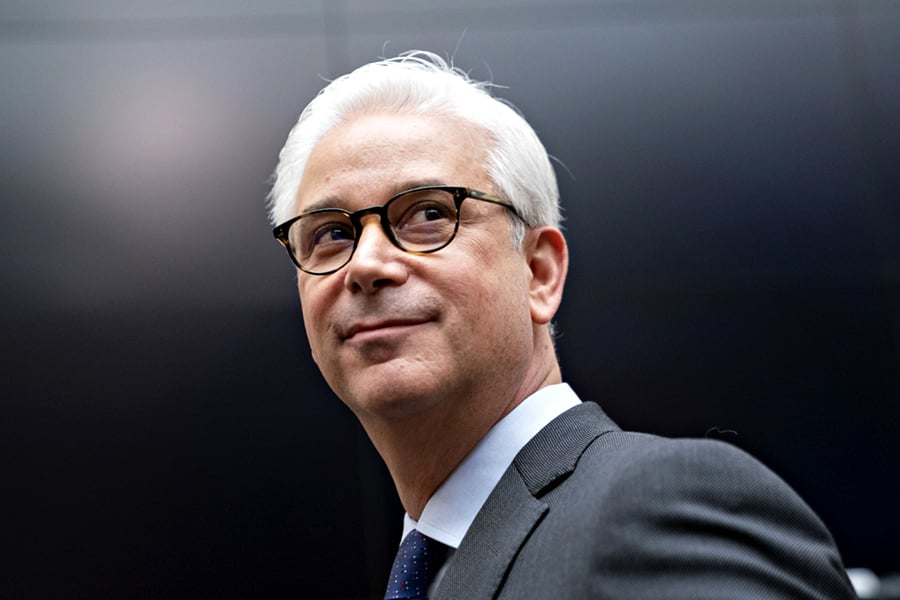

A year after taking over as CEO of Wells Fargo & Co., Charlie Scharf's plan for Wells Fargo Advisors, which has been losing advisers to rivals and retirement for years, and the bank's broader wealth management franchise is taking shape.
The strategy appears to be nothing new, but Scharf is executing it under the incredible duress of COVID-19, a Herculean task in itself.
Scharf looks to be doing what CEOs of beleaguered, distressed enterprises often do: they sell off non-essential business lines, shut down side businesses and merge large groups into another to reduce management headcount and costs.
It's tough work but Scharf's series of moves, discussed in the past year and outlined in Wells Fargo's earnings call this month, shows that he has a strategy to revive the Wells Fargo wealth management enterprise.
The bank and its assorted business lines, including wealth management, have been under intense pressure since revelations in 2016 that Wells Fargo bank employees had secretly created millions of unauthorized accounts in the names of customers without their consent.
The series of changes, discussed below, are all well and good, from the corporate level. But what about its 13,513 financial advisers?
Has Scharf reached out to Wells Fargo Advisors' top financial advisers or the broader ranks and discussed his plans for the bank and how he intends to bolster morale? If so, what have those talks been like, and what initiatives will come from them?
Like many CEOs, Scharf holds conferences and town halls with all employees, and those meeting the past year have been carried out for the most part not face to face but virtually. And he knows the language of advisers, with his father working as a broker.
A spokesperson said she did not know if Scharf had any private discussions with financial advisers.
Shareholders of Wells Fargo stock undoubtedly are concerned; they've seen the value of their shares drop precipitously in the past year during the COVID-19 pandemic, with its one-year high 12 months ago at $49.88. Wells Fargo shares closed at $32.63 after trading on Wednesday, the same day as the inauguration of President Joe Biden, a decline over 12 months of 34.6%
Over the same period, which saw stocks whipsawed due to the sell-off last February and March triggered by pandemic fears, the Vanguard Financials Index Funds ETF shares were basically flat. The S&P 500 Index, which hit a new 52-week high Wednesday, is up roughly 17% in the past 12 months.
Scharf is making classic changes to streamline and reduce costs at Wells Fargo's Wealth and Investment Management unit, known as WIM, which houses Wells Fargo Advisors.
In broad strokes, here are the most significant changes for financial advisers at Wells Fargo.
Jim Hays, the head of Well Fargo Advisors, is gaining more responsibility as the bank's 800 or so private wealth advisers, private bankers and portfolio managers, move under his purview.
Wells Fargo is also cutting its international wealth management business and is looking into selling its asset management group.
As part of broad cost-cutting, Wells Fargo in October said it laid off a "sizable group" of salaried advisers in October. Such advisers are less lucrative for the bank than higher-producing wealth managers, who earn a percentage of total revenues and not a wage.
Last year, another big chunk of Wells Fargo advisers either jumped to a new firm or retired. The firm is combatting that wave by actively recruiting from competitors and beefing up bonuses to advisers who commit to retiring with the firm.
A clear flub in Scharf's cost-cutting was the announcement in October for the bank to cut its 401(k) match, hitting many of its advisers in the pocketbook. Apparently realizing the impact of the move, the bank just two days later reversed its decision and said it was abandoning the cut to employees' retirement plans.
Financial advisers at any firm, from a small registered investment adviser to a giant wirehouse, want to feel like senior management is listening to their concerns. And management should listen. Advisers know the clients better than almost anyone at giant businesses like Wells Fargo.
At Wells Fargo's direct competitors, Merrill Lynch and Morgan Stanley, the strategies for advisers could not be clearer. Merrill Lynch wants its Thundering Herd to bring in more new customers and Morgan Stanley wants its advisers to grab a bigger share of clients' assets. Both have provided advisers with technology and compensation plans to drive that behavior.
Almost a year ago, just as the country was hunkering down due to the pandemic, this column asked what the strategy was for Wells Fargo and its advisers.
The plan has been revealed. What's not clear is how Wells Fargo's financial advisers are smack dab in the middle of it.

Executives from LPL Financial, Cresset Partners hired for key roles.

Geopolitical tension has been managed well by the markets.

December cut is still a possiblity.

Canada, China among nations to react to president-elect's comments.

For several years, Leech allegedly favored some clients in trade allocations, at the cost of others, amounting to $600 million, according to the Department of Justice.
Streamline your outreach with Aidentified's AI-driven solutions
This season’s market volatility: Positioning for rate relief, income growth and the AI rebound
